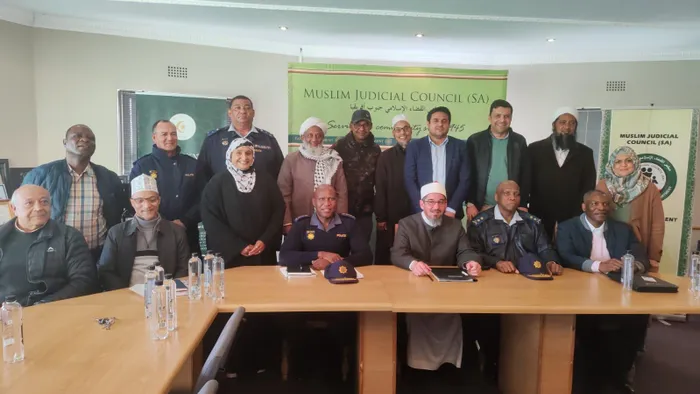
A meeting was hosted this week by the Muslim Judicial Council with the South African Police Services Western Cape leadership and various civil society and public representatives from the community to seek collective solutions to the violence ravaging the Cape Flats and surrounding areas.
Image: Supplied
The Muslim Judicial Council (MJC) has called for a transparent plan of action to secure the safety and wellbeing of gang and violence ridden communities in Cape Town, following a meeting with various stakeholders on Monday.
The most recent incident of violence saw a mass killing in Bishop Lavis on Friday night which claimed the lives of four people. Recent weeks have seen a surge in mass shootings wreaking havoc in areas across the city, including in Mitchells Plain, Kraaifontein, Mfuleni, and Lower Crossroads.
MJC president, Sheikh Riad Fataar said they called the meeting in their capacity as a senior religious authority and civil society stakeholder.
The purpose of the meeting was to initiate “meaningful deliberations on the immediate and coordinated implementation of solutions”.
The meeting saw civil society groups, political parties and the provincial police in attendance.
The MJC called for a transparent plan of action.
Suggestions included visible policing in high crime areas and the implementation of targeted programmes to prevent the criminal recruitment of children and adolescents into gangs.
Attendees expressed optimism about the way forward.
National Coloured Congress (NCC) leader Fadiel Adams said: “I’m optimistic. I think it’s about time our religious fraternity and all faiths come together and stand with us, as parents and as activists. I believe we can come up with something that truly benefits our kids.”
He added that meaningful dialogue about how sectors like sport, social development, and education can be brought into the fold were necessary.
ANC leader of the opposition in the provincial legislature, Khalid Sayed said it was a very constructive meeting where practical ideas were put forward to police in the province.
“The one focus being for greater police visibility and actual boots on the ground in crime-ridden areas. Also to make sure there’s greater cooperation.
"The other thing that came through which Saps agreed with, was for faith leaders need to be called upon. (Saps) must feel free to walk hand in hand with religious leaders in communities because it’s at the community level where religious leaders are active. Whether it be in the mosques or churches, where youngsters who are going into this type of criminality where, their families are at.
"The strengthening and vetting of CPFs also needs to happen. Another big aspect was that tackling crime in our communities is not just an issue of policing and boots on the ground. It requires all spheres of government. It requires the social and economic aspects to also be in place. All spheres of society and government must work together to ensure young people have alternatives. From our side, we need to ensure that the necessary oversight must take place to ensure Saps and government implement what they are committing when they have meetings such as this,” Sayed said.
A follow-up meeting to discuss a workable plan is expected in the coming weeks.
Western Cape police did not respond to requests for comment by deadline.
Cape Times